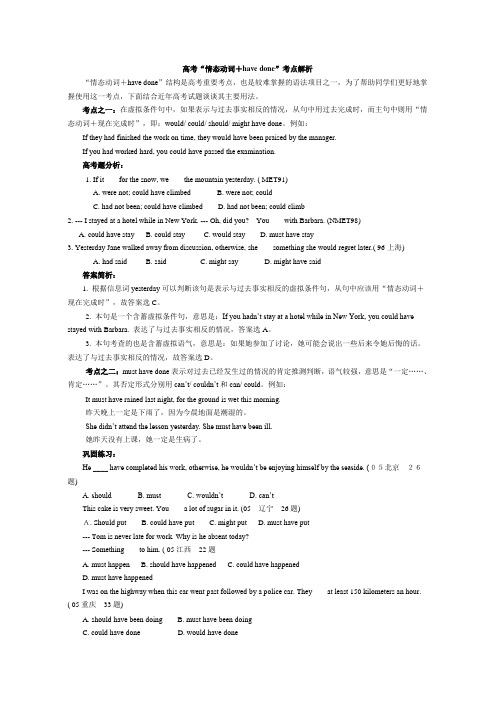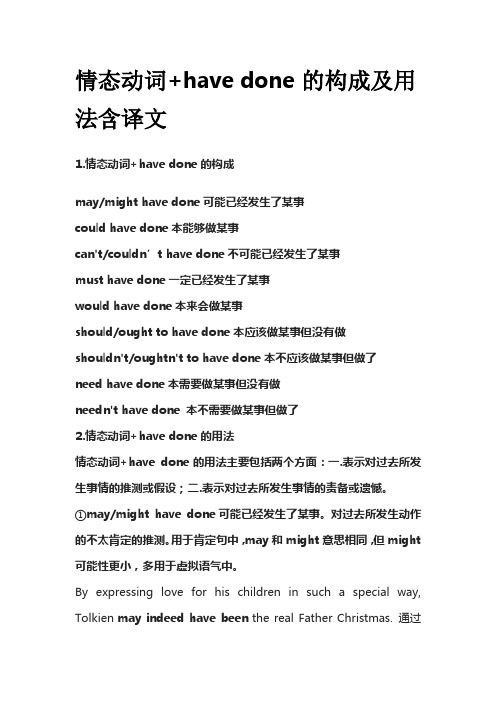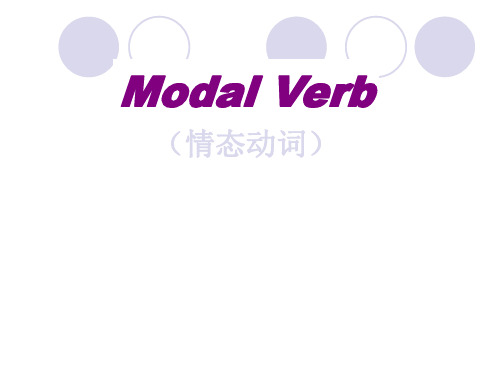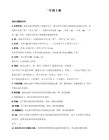“情态动词+have-done”讲解
情态动词+have done

情态动词+have done:对过去行为或动作表示推测、评论或判断一、虚拟语气1、should have done:过去本应该做某事却未做否定结构should‘t have done:过去本不该做某事却做了2、ought to have done:过去本应该做某事却未做否定结构oughtn‘t to have done:过去本不该做某事却做了3、need have done:过去本有必要做某事却未做否定结构needn‘t have done:过去本没必要做某事却做了4、could(不能用can)have done:过去本能够做某事却未做否定形式couldn‘t have done没有虚拟语气的用法couldn’t have done只能表推测,=can’t have done:过去不可能做了某事5、might(不能用may)have done:过去本可以做某事却未做否定形式might not have done没有虚拟语气的用法。
might not have done只能表推测,=may not have done:过去可能没有做某事二、推测1、must have done:过去肯定做了某事。
不存在mustn’t have done的形式。
否定或疑问形式须用can(could) have done(不可能,肯定不会)来表示。
2、may/might have done :过去可能做了某事may比might 表示的可能性在说话人看来稍大些。
may/might not have done:过去可能没有做某事3、can/could have done:can have done一般用在否定句和疑问句中,表示不相信或怀疑的态度。
could have done还可以用于肯定句,表示本来可能完成而实际未完成。
PS: 表示推测过去某动作发生的可能性时,就表示的可能性程度而言:mus t>could>may>might 情态动词的回答方式:。
情态动词have_done

情态动词+have+done是历年高考的重点和难点之一,现将其用法总结归纳如下:一、must+have+done表示对过去事情的肯定推测,译成“一定做过某事”,该结构只用于肯定句.1. It must have rained last night, for the ground is wet. 昨晚一定下雨了,因为地面还是湿的2. You must have been mad to speak to the servant.你和仆人说话,一定是发疯了二、“can't+have+done”表示对过去事情的否定推测,译成“不可能做过某事”。
1. Mr. Smith can't have gone to Beijing, for I saw him in the library just now. 史密斯先生不可能去北京了,我刚才还在图书馆见过他。
2.Mary can't have stolen your money. She has gone home.玛丽不可能偷你的钱,她回家去了三、“can+have+done”表示对过去行为的怀疑,用于疑问句,译成“可能做过……吗?”。
1.There is no light in the room. Can they have gone out?屋里没有灯,他们可能出去了吗?2. There is nowhere to find them. Where can they have gone? 到处找不到他们,他们可能到什么地方去呢?四、could+have+done’是虚拟语气,表示对过去事情的假设,意思是本来能够做某事而没有做.He could have passed the exam, but he was too careless.本来他能通过考试,但他太粗心五、“may+have+done”表示对发生过的事情的推测,意思是“可能已经”或“也许已经”,用于肯定句中。
情态动词+have_done

高考“情态动词+have done”考点解析“情态动词+have done”结构是高考重要考点,也是较难掌握的语法项目之一,为了帮助同学们更好地掌握使用这一考点,下面结合近年高考试题谈谈其主要用法。
考点之一:在虚拟条件句中,如果表示与过去事实相反的情况,从句中用过去完成时,而主句中则用“情态动词+现在完成时”,即:would/ could/ should/ might have done。
例如:If they had finished the work on time, they would have been praised by the manager.If you had worked hard, you could have passed the examination.高考题分析:1. If it ___ for the snow, we ___ the mountain yesterday. ( MET91)A. were not; could have climbedB. were not; couldC. had not been; could have climbedD. had not been; could climb2. --- I stayed at a hotel while in New York. --- Oh, did you? You ___ with Barbara. (NMET98)A. could have stayB. could stayC. would stayD. must have stay3. Yesterday Jane walked away from discussion, otherwise, she ___ something she would regret later.( 96上海)A. had saidB. saidC. might sayD. might have said答案简析:1. 根据信息词yesterday可以判断该句是表示与过去事实相反的虚拟条件句,从句中应该用“情态动词+现在完成时”,故答案选C。
情态动词+have done的构成及用法含译文

情态动词+have done的构成及用法含译文1.情态动词+have done的构成may/might have done可能已经发生了某事could have done本能够做某事can't/couldn’t have done不可能已经发生了某事must have done一定已经发生了某事would have done本来会做某事should/ought to have done本应该做某事但没有做shouldn't/oughtn't to have done本不应该做某事但做了need have done本需要做某事但没有做needn't have done 本不需要做某事但做了2.情态动词+have done的用法情态动词+have done的用法主要包括两个方面:一.表示对过去所发生事情的推测或假设;二.表示对过去所发生事情的责备或遗憾。
①may/might have done可能已经发生了某事。
对过去所发生动作的不太肯定的推测。
用于肯定句中,may和might意思相同,但might 可能性更小,多用于虚拟语气中。
By expressing love for his children in such a special way, Tolkien may indeed have been the real Father Christmas. 通过这种特别的方式表达对孩子们的爱,托尔金可能真的是真正的圣诞老人。
(新外研版必修二)You can check his office. He might have been there already. 你可以去他的办公室看看。
他可能已经到那儿了。
If he had been given more encouragement, he might have made greater progress. 如果给他更多的鼓励,他可能会取得更大的进步。
情态动词 have done用法课件

(2)表推测,“可能”、“也许”,暗含不确 定,等于possibly, perhaps, maybe。可用于否 定和肯定句,但不用于疑问句。Might 比may更 不确定,不表过去时。
他也许马上就来。
He may/might come soon. 他也许正在做功课。
He might/may be doing his homework now. (3)用于表示让步的状语从句或分句中
3)回答“need”提出的问题。例如: Need I go there with her?
Yes, you must. No, you needn't. 试对比“must”提出的问题: Must I go there with her?
Yes, you must/have to. No, you needn't.
B: It __m_a_y__ be the headmaster. A:It _c_a_n___ not be him. He has gone
out.
B: Then it _m_u_s_t__ be Mr Smith. He looks like the headmaster very much.
will和would
By now she will be eating dinner.
推测
My brother will help you with the luggage.
willingness
Every evening he would come to say goodnight.
过去的习惯性动作
2)推测
They should/ought to be home by now. 推测,不太肯定
高考“情态动词+have_done”考点解析

2、根据句意“我妹妹昨天在大剧院见过他”,所以,一定是对过去已经发生的否定的判断,答案选A。
3、本句表达的是对过去发生过的情况的疑问,所以应该用could have done,答案选C。
It must have rained last night, for the ground is wet this morning.
昨天晚上一定是下雨了,因为今晨地面是潮湿的。
She didn’t attend the lesson yesterday. She must have been ill.
A. should B. must C. could D. would
4. I didn’t see her in the meeting-room this morning. She ____ at the meeting. (1995 上海)
A. mustn’t have spoken B. shouldn’t have spoken
A. might B. should C. can D. will
2. The window was broken. Tom ____ have done that, for he was a little naughty.
A. could B. might C. should D. ought to
--- It ___ a comfortable journey. (MET95)
A. can’t be B. shouldn’t be C. mustn’t have been D. couldn’t have been
2. My sister met him at the Grand Theatre yesterday, so he ____ your lecture. (2002 上海)
情态动词+have-done用法
情态动词+have done (have been doing )一、教学目标情态动词+have done (have been doing ) 的用法二、生成问题情态动词+have done (have been doing ) 的用法有哪些1、should(ought to)+have done (have been doing )表示“本来应该做而实际上没做”,其否定式表示“本来不该做却做了”,常含有责备的语气。
You should have been here five minutes ago.五分钟之前你就应该到这里了。
How I regretted the days when I had played and should have studied.我多么懊悔我本应该好好学习的日子都玩掉了。
We shouldn’t have been resting so long.我们真不该休息这么长时间。
2、《3、could+have done表示“本来有能力做而实际上没有做”。
—We could have walked to the station, it was so near.这么近,我们完全能走着来车站。
—Yes. A taxi was not at all necessary.是呀,根本不必搭车的。
I could have won if I hadn’t fallen over.要不是摔倒,我准能赢。
3、needn’t+have done表示“本来不必做的事,实际上做过了”。
I got up early, but needn’t have done so, because I had nothing to do that morning.那天早上我起得很早,可我根本不必起这么早,因为我无事可做。
You needn’t have written such a long article. The teacher only asked for 300 words, and you have written 600 words.你没有必要写这么长的文章,老师只要求写300字,你写了600字。
情态动词+have done用法讲解
1. would have done用于虚拟语气,表示对过去可能发生的情 况进行推测,意为“本来会做” He would have helped me, but he was so busy. 2. need have done 表示“本来需要做某事,但事实上没有做” needn’t have done 则表示“本来不需要做某事,而实际上做了 We need have hurried to school. In that case, we wouldn’t have been late for the class. I needn’t have cooked so many cakes; only two children came.
3. should have done 表示“本来应该做某事,二十几上没有做” shouldn’t have done 则表示“本来不应该做某事,而实际上做 了”,含有职责对法或自责之意。 The essay should have been finished last week, but I forgot it. Tom is crying ; I shouldn’t have been so harsh on him. 4. might have done 表示使对过去情况把握性不大的推测,意为 “可能坐过…”或表示说话人因某人没做某事而不满,意为 “本应该做…” He might have won the race, if you had been backing him. 5. must have done 表示对过去情况的肯定推测,意为“一定做过 某事”,该结构只用于肯定句 It must have rained last night, for the ground is wet.
“情态动词have-done”重点讲解
03
have-done的句型结构
have done句型
表示现在完成时,强调动作已经完成 但对现在有影响。
时态:现在时间点之前完成的动作。
用法:have done + 过去分词,例如: I have finished my homework.
had done句型
表示过去完成时,强调动作在过 去的某个时间之前已经完成。
定义
表示过去的某个时间点,某个动作已经完成或发生 的动作。
表示过去的某个时间点,某个动作已经完成或发生 的动作,并且强调这个动作对现在的影响。
表示过去的某个时间点,某个动作已经完成或发生 ,并且强调这个动作对未来的影响。
用法分类
02
01
03
表示过去的某个时间点,某个动作已经完成或发生, 并且强调这个动作对现在的影响。
3. I _____ (see) the film twice, so I don't want to see it again. (用适当的形式填空)
答案:have been working 答案:has finished 答案:have seen
翻译题练习
1. 我已经完成了我的论文,现
在可以放松一下了。
时态:将来时间点之前完成的动作。
04
have-done的语境与语义
表示经验
用于描述个人或团体过去所经历的事件或状态,强调经验或经历 。
例如:I have been to the Great Wall before. (我之前去过长城 。)
表示结果
01
强调某个动作或行为所产生的结 果或影响。
02
A. has taken B. has lifted C. has been taking D. has been lifting
情态动词+have done 意义及用法区别
总结:情态动词+have done 的区别1、must+have +done只用于肯定句:表对过去情况的肯定推测,意思是“想必/准是/一定做过某事”--Tom must have gone to New York. 汤姆一定已去纽约了。
---No,he can't. I saw him on the street just now. 不,不可能。
我刚才在街上看到他。
2、should/ought to + have done①肯定句:表“本应该做某事,而实际未做”,含责备或遗憾之意②否定句:表“本不应该做某事,而实际做了”3.need have done①肯定句:本需要做某事,而实际未做②否定句:本不必做某事,而实际做了4.may/might have done①肯定句:表对过去的推测,“过去可能做过某事”,might可能性更小②否定句:表对过去的推测,“过去可能没有做过某事”③虚拟语气:might have done, 表示“本可以做某事,而实际未做”Eg. She might have called for help. 她有可能会呼救的。
(事实上并没有呼救)You might both have been caught and killed. 你们俩都可能被抓住杀掉。
(事实上并没有被抓住杀掉)5.can/could have done①肯定句:表对过去的推测,“过去可能做过某事”,could可能性更小②否定句:表对过去的推测,“过去不可能做过某事”③疑问句:提出质疑,表示“可能会做某事”Eg. Where can she have gone? 她会去哪儿呢?Could you have left your book on the bus?你会不会把书落在了公交车上呢?④虚拟语气:could have done 表示“可能发生某事,但实际未发生”eg.You were stupid to go skiing there---you could have broken your leg.你到那个地方去滑雪真傻,你可能会摔断腿的。
- 1、下载文档前请自行甄别文档内容的完整性,平台不提供额外的编辑、内容补充、找答案等附加服务。
- 2、"仅部分预览"的文档,不可在线预览部分如存在完整性等问题,可反馈申请退款(可完整预览的文档不适用该条件!)。
- 3、如文档侵犯您的权益,请联系客服反馈,我们会尽快为您处理(人工客服工作时间:9:00-18:30)。
A. must be C. should be
B. must have been D. should have been
答案B关键词是didn’t,说明动作发生在过去,所以是 对已经发生过的情况的推测判断。
2. --- I rang your home yesterday. A man answered but I didn't recognize the voice. --- On, it ___ my brother, Peter.
done that, for he was a little naughty.
A. could C. should
B. might D. ought to
四、如果对过去情况推测判断的句 子是疑问 句和否定句,只能用can/could和can’t,/ couldn’t。例如:
他不可能去国外,我一个小时前还见到他 呢。
一、在虚拟条件句中,如果表示与过去 事实相反的情况,从句用过去完成时, 而主句中则用“情态动词+现在完成 时”,
即
would/ could/ should/ might have done
如果他学习努力, 他就会通过高考了。
If he had worked hard, he would have passed the Collage Entrance Examination.
B. shouldn’t be来自C. mustn’t have been D. couldn’t have been
根据They were already five people in the car, but they managed to take me as well.一句中的时态,应该是对过去情况的推测 判断,因为车上已经有5位人了,在带上我一个,可以断定
他通过考试了吗? 不,他不可能通过考试。他学习不努力。
1. --- There were already five people in the car but they managed to take me as well.
--- It ___ a comfortable journey.
A. can’t be
He can’t have gone abroad; I saw him an hour ago.
He can’t have gone abroad; I saw him an hour ago.
他不可能去国外,我一个小时前还见到他 呢。 --- Can he have passed the exam? --- No, he can’t have. He didn’t work hard.
测判断,语气较强,
意思是 “一定……、肯定……”
昨天晚上一定是下雨了,因为今早地 面是潮湿的。
It must have rained last night, for the ground is wet this morning.
1. I didn’t hear the phone. I ____ asleep.
这一定是一次不舒适的旅行。所以,本句表达的是对过去 否定的推测判断,应该用can’t/ could have done来表达。故 答案选D。
2. My sister met him at the Grand Theatre yesterday, so he ____ your lecture. (上海)
A. had said B. said C. might say D. might have said
答案D 本句考查的也是含蓄虚拟语气,意思是:如果 她参加了讨论,她可能会说出一些后来令她后悔的话。 表达了与过去事实相反的情况。
二、must have done 表示对过去已经发生过的情况的肯定推
1. Sorry, I’m late. I ____ have turned off the alarm clock and gone back to sleep again.
A. might C. can
B. should D. will
2. The window was broken. Tom ____ have
意思是“可能,或许……”。
她没能及时到达那儿。她可能没赶上 汽车。
She didn’t get there in time. She may have missed the bus.
他今天没来上课,他可能病了。
He didn’t come to school today. He might have been ill.
1.--- I stayed at a hotel while in New
York.
--- Oh, did you? You ___ with
Barbara.
A. could have stay B. could stay
C. would stay
D. must have stay
答案 A,本句是一个含蓄虚拟条件句,意思是:If you
A. couldn’t have attended B. needn’t have attended C. mustn’t have attended D. shouldn’t have attended
A. must be C. should be
B. must have been D. should have been
答案B 本句的意思是:我昨天向你家里打的电话。这是对过 去情况的推测判断,应该用must have done结构
三、may/ might have done 也用于对已经发生过的情况的肯 定推测 判断,但语气稍弱,
had stay at a hotel while in New York, you could have stayed with Barbara. 表达了与过去事实相反的 情况。
2. Yesterday Jane walked away for discussion, otherwise, she ___ something she would regret later. (上海)
